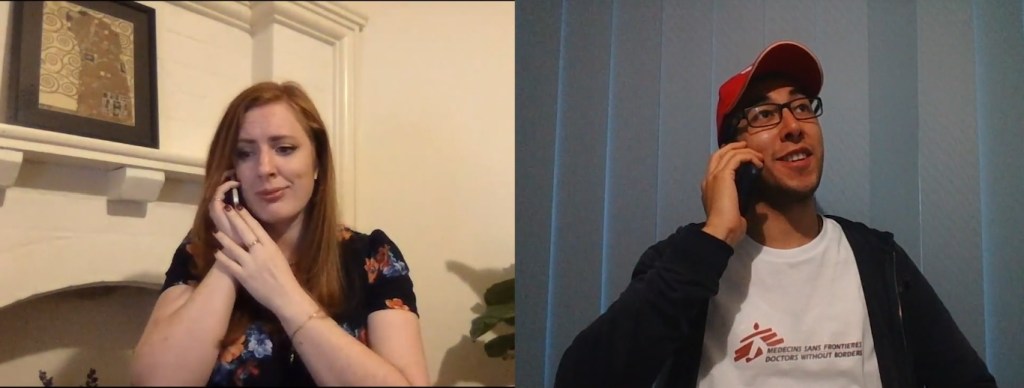
By Stella Joseph-Jarecki (Enquiries: stellamusicwriter.wordpress.com)
I recently put out the call to my immediate musical network, to see who would be happy to share with Fever Pitch Magazine how they have adapted during this period of social distancing. The last few months have been disorientating and frequently exhausting, and stage three lockdown has recently been re-implemented in Victoria. Prioritising your mental and physical wellbeing is more important than ever.
To this end, I’d like to present a series entitled Creativity Amongst Crisis. I hope it can supply you with some tips, optimism, and most importantly, the knowledge that are you not alone in this crappy time. First up is emerging lyric baritone Daniel Felton, who lends his dulcet tones to operatic choruses and a capella groups alike. You can follow Daniel’s work through his Facebook and Instagram pages.
Can you tell us a bit about the repertoire you have been working on recently?
Recently I finished filming a digital version of Gian Carlo Menotti’s The Telephone with Gertrude Opera and have taken part in some virtual projects with Burgundy Blue, Exaudi and Choral Edge and a collaborative project led by Nic Cester from the band Jet.
I am currently learning Gugliemo for Cosi Fan Tutte, the role of Don in Don Giovanni and preparing a handful of roles with Gertrude Opera for the Yarra Valley Opera festival in October (I can’t mention specifically just yet!). I’m also looking at the Dichterliebe song cycle by Schumann. Other than that, just general practice of piano and violin stuff (nothing specific).
What have you found to be most challenging aspects of this time of COVID-19, as a performing artist and more generally day to day?
The most challenging part I have found about the COVID-19 isolation is not having people around me to make music with. For me, music is something that I enjoy to an even greater extent when sharing it with friends and colleagues. Not having that direct contact with other musicians was initially quite hard. I often found myself longing for something as simple as just hearing instruments or voices producing chords or counter melodies. Granted, there have been manageable ways of making music with others through the internet, but it is never the same.
Anything particular you’d like to reflect on as we slowly come out of this strange and disorientating socially-distanced period?
I certainly have had time to reflect on how one keeps a positive mind set whilst also keeping the mind active. Classical musicians in our day-and-age will inevitably face times where we are less busy or occupied; and by extension less happy. This period in time has been a test to see if I have the stamina to pull through the isolation and loneliness, and keep the music alive in myself. If I can get through this hard time, I know have the skills required to do so in the future.
Do you have any projects in the works you’d like to share?
With Gertrude Opera, I have been working on a virtual production of The Telephone by Menotti. Soprano Bethany Hill and I were both able to record and film our separate parts from our home states, and they were edited together by our Director Linda Thompson and Musical Director Matthew Toogood. It is a modern take on a classic, and a fantastic idea for how to keep opera going in a time when opera houses and theatres are closed.

Have you learnt anything specific that you may not have been forced to learn, were it not for COVID-19 restrictions and the flow-on effects?
I have learned two main skills in my time during isolation. The first is my reliance on technology. I found myself really depending on technology for communication, but eventually branched out further using internet resources, computer software and recording equipment to use both for practice and performance. It did take some getting used to, but I was able to acquire everything I needed to keep things going.
The second was keeping fit and focused. Before isolation, I had designated times I would practice fit in between work, rest and rehearsals. As I had far more time on my hands, and was trapped at home, I found my overall energy levels to be far lower; this was made all the more difficult with Ramadan fasting.
In response to this, I put a lot of effort into scheduling physical exercise and going for walks as frequently as I could. I would do the same for music practice. I would force myself to get motivated, and once I had started to sing or study, it all became easier from there. All of this was possible due a tight schedule and rigid day to day plan which I would adhere to as adamantly as I could.

How do you sustain hope for the future, or overcome periods where you feel less motivated?
One of the major benefits of living in this day-and-age is access to social media and technology. This allowed me to stay in close touch with family and close friends. I consider myself a people person in the sense that it is the people in my life that bring me joy. Despite not being in their physical presence, it was assuring to know we could still be there to support one another from a distance.
We all had obstacles to overcome in these hard times, but we were never alone, and we would always support each other when the times became very tiring and difficult. I made a personal motto of mine to remind myself “even in isolation, we stand and sing together”.

